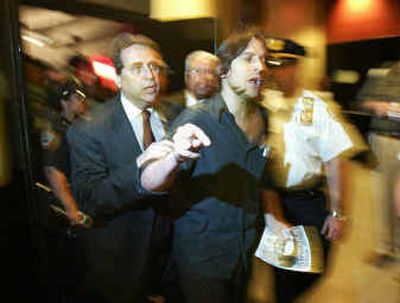Giuliani defends 9-11 heroes

NEW YORK – Former Mayor Rudolph Giuliani passionately defended the city’s police and fire departments Wednesday amid criticisms that rescue operations at the World Trade Center fell short on Sept. 11, 2001.
Testifying before the independent Sept. 11 commission, Giuliani said that police and firefighters evacuated thousands of people before the twin towers collapsed. The criticism is misplaced, he argued, and would be better directed at the terrorist hijackers.
“We are all hurt, we are all damaged, we are all very angry, and we are all feeling the loss of heroes that we love,” Giuliani said on the second day of hearings on the performance of public-safety agencies. “We have to channel our anger toward doing all that we can to prevent and ameliorate any further attack, because by all predictions, a further attack will probably come.”
But Giuliani was heckled during his testimony by some victims’ family members, and faced skepticism from commissioners and others who said a fractured command structure and poor radio communications had hampered relief efforts.
“It is not just radio; it is one of culture,” said Jerome M. Hauer, former director of the New York Office of Emergency Management. “The culture is one where there is still no joint command post.”
Giuliani, who testified along with Homeland Security Secretary Tom Ridge and current Mayor Michael Bloomberg, gave a searing account of his actions the morning of Sept. 11. He told the commission that shortly after he arrived on the scene, he spotted someone jumping from one of the towers to escape the heat and the flames.
“When I looked up at one point, I realized I saw a man hurling himself out of the 102d or 103d floor, and I stopped for one second or two seconds, and I was in shock,” Giuliani said. “I said to the police commissioner that we are in uncharted territory.”
Giuliani set up a temporary command center within a block of the towers, in the city’s financial district. But the mayor and his aides were forced to evacuate when the South Tower, the first to collapse, came down. They escaped through a tunnel to a nearby building with access to the street, where an orderly evacuation was under way.
“What I saw was very inspiring,” said Giuliani, whose leadership of the city in the aftermath of the attacks catapulted him to worldwide fame. “I saw people running and fleeing, but I didn’t see people running over one another. I didn’t see chaos.”
Midway through his testimony, Giuliani was heckled briefly by a handful of victims’ family members and an activist who blamed what they said was a chaotic response by the city for the large loss of life — 2,749 dead — at the trade center. Two of the hecklers were removed from the room by security staff.
“My son was murdered,” shouted Sally Regenhard, who lost her firefighter son, Christian, in the attack.
Giuliani, mayor through 2001 and now a management consultant, failed to allay concerns of commission members that the city’s command structure and communications system functioned poorly the day of the attack.
One member, Republican John F. Lehman, said he remained unconvinced that New York City had bridged divisions between its police and fire agencies that hamper rescue efforts.
Commission member Richard Ben-Veniste, a Democrat, said the lack of equipment that would enable police and firefighters to communicate at emergency scenes remained a problem.
After Tuesday’s hearing, when the commission released findings that communications and command failures slowed rescue operations, likely costing additional lives, the panel disclosed additional results of its investigation showing missteps during the rescue operation.
The commission said that because public-safety agencies did not have compatible radio networks, emergency workers on the scene did not know which stairwells were open and which, if any, elevators and public-address systems were working.
The panel said the fire department had no set procedure for debriefing evacuees for information about conditions in the towers that might have helped in the rescue efforts.
One fire commander initially estimated after the planes struck that rescue workers still had hours before any possible collapse. The projection proved drastically wrong. The South Tower fell after 56 minutes, at 9:59 a.m., and the North Tower followed at 10:26.
Ridge testified that the federal government was encouraging local governments to develop unified command structures in case of terrorist attacks. Responding to Bloomberg’s complaints that New York was not getting its fair share of federal anti-terror funding, Ridge said the White House was pushing for changes in its formula that determines how much each jurisdiction gets.
Ridge told the commission that his Homeland Security Department must report to 88 congressional committees and subcommittees. Last year, he said, he and his senior staff testified 145 times before Congress.
“I couldn’t believe it,” said former New Jersey Gov. Thomas H. Kean, the commission chairman. “That is a recipe for dysfunction.”
The commission’s 12th and last public hearing is scheduled for June 8-9 in Washington, to discuss national crisis management and the Sept. 11 plot. Its final report is due July 26.